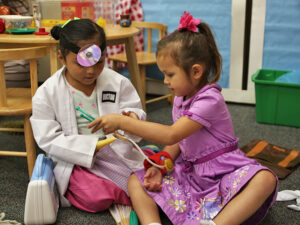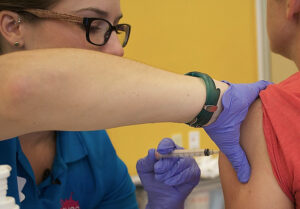Report gives children's services in California more low grades than high ones

FERMIN LEAL/EDSOURCE TODAY
Aimee Perez, left, dresses as a doctor as she gives a check-up to Chelsea Conway during their preschool class at Land School in Westminster, Calif. Preschool education received a grade of B- in the 2016 California Children's Report Card.
California earned poor marks for several services it provides for the well-being of children, including those dealing with trauma, abuse and other mental and behavioral challenges, according to a report issued Wednesday by the advocacy organization Children Now.The 2016 “California Children’s Report Card” also gave low marks to state services for infant and toddler care, teacher training and evaluation, obesity prevention and nutrition, and foster youth education. The state got highest marks for providing health coverage to children under the Affordable Care Act, as well as relatively high ones in other areas such as linking the high school curriculum to career pathways, introducing Common Core academic standards and Next Generation Science Standards, after-school and summer learning, and targeting state funds at children with the highest needs.
he report card, released annually for more than two decades, issued letter grades (A through F) for how the state is doing in 31 key education, health and child welfare areas that are aimed at the neediest student populations. The goal is to encourage state lawmakers and educators to increase investments in these areas.
The grades are not based on any standardized assessments, but reflect the views of the organization based on its interpretation of data and reports from a wide range of sources.
“California is a wealthy state, with more assets than most to devote to its children’s well-being,” the report said. “It’s time to put more of our resources to work for kids, by investing in quality programs to help lift them out of poverty and set them on the road to success.”
Nearly half of the state’s 9 million children come from poor or low-income families. Yet many don’t have comprehensive access to services that canReport gives children’s services in California more low grades than high ones | EdSource:
Some districts exempt students in special ed from vaccination law
CREDIT: JANE MEREDITH ADAMS/EDSOURCE TODA
California now has one of the strictest vaccination laws in the country, but ambiguity in its wording has left school districts deciding on their own whether to grant special education students a de facto exemption.
The California Department of Public Health and the California Department of Education have not yet issued guidance on how to apply the vaccination law to special education students. Under the federal Individuals with Disabilities Education Act, students who qualify for special education services, such as speech therapy or small group instruction, must receive those services. Failure to comply leaves districts vulnerable to lawsuits from parents.
At the same time, beginning July 1, the state law will require all kindergarten, transitional kindergarten and 7th-grade students to be vaccinated against 10 communicable diseases before they are allowed to attend school, unless they have a medical condition that makes them unable to do so. Under the new law, parents can no longer refuse to vaccinate their children in public or private schools and child care centers based on their personal beliefs.Some districts exempt students in special ed from vaccination law
